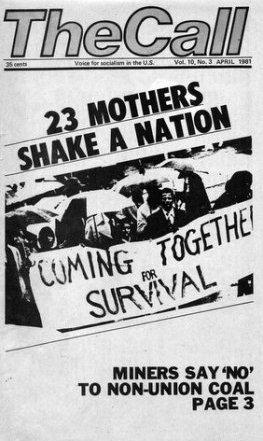
First Published: A letter to the Editor in The Call, Vol. 10, No. 3, April 1981.
Transcription, Editing and Markup: Paul Saba
Copyright: This work is in the Public Domain under the Creative Commons Common Deed. You can freely copy, distribute and display this work; as well as make derivative and commercial works. Please credit the Encyclopedia of Anti-Revisionism On-Line as your source, include the url to this work, and note any of the transcribers, editors & proofreaders above.
Despite the talk of an era of “free debate” in the CPML, it still seems that anyone challenging the CPML dogma is liable to be accused of abandoning revolution and becoming a “former Marxist.” This was clear from D. Wane’s and Susan K.’s responses to my “Message to the Movement” article. (The Call, Feb. 1981)
D. Wane, for instance, claimed that I believe the CPML’s errors were “due to the “principles of Marxism”–notice how he throws in quotation marks to make it seem as if he’s only repeating what I said.
If readers go back to my article, they’ll see that isn’t what I said. It’s not the principles of Marxism that I criticized, though I did say much work had to be done to figure out what those are and how they apply to U.S. conditions.
What I oppose are the “principles” and approach of OUR TREND, of which the CPML and the Marxist-Leninist-Mao Zedong Thought (MLM) parties in the capitalist world are a part. Marxism isn’t the problem; it’s the CPML’s brand of Marxism that’s at issue here. There’s a big difference between the two.
What passed for Marxism in the CPML and most of our trend was mostly just a hodge-podge of mis-applied Leninism, selected quotes from Mao and heavy doses of Cultural Revolution fanaticism. This cannibilization of SELECTED Marxist theories and foreign experiences was then neatly wrapped in the form of vague and absolutist principles lacking concrete analysis or application to the American realities–the exact opposite of the genuine Marxist method.
What it produced, of course, was the suicidal alienation of the Marxist-Leninists from the American masses and a situation where, after a decade’s work, we have basically no impact at all in society as communists. In the advanced capitalist world, the MLM trend is also in a state of collapse, a fact which Susan K. and D. Wane neither deny nor explain.
Interestingly, the March 2, 1981, issue of Beijing Review helps us indirectly get a handle on why our version of Marxism was so unsuccessful and irrelevant. Two articles in the Review clearly show that Mao Zedong Thought was nothing more than Marxism applied to China and her third-world conditions, and document that this was Mao’s own opinion of his “thought.” And yet, a whole slew of organizations (including the CPML and LRS) adopted Mao Zedong Thought as the “banner of the international communist movement” and a key pillar of their ideology!
The point here and in my article, the real question, is whether the CPML’s version of Marxism is correct. But instead of debating that question forth-rightly, D. Wane and Susan K. set up a straw man, falsely claimed that I opposed Marxism rather than CPMLism, and then whipped themselves up to do battle with “former Marxists,” as Susan K. labelled me.
There’s not much room for debate, is there, if you have to sing the praises of the CPML’s basic doctrine in order to be considered a Marxist?
Jim Hamilton, Chicago, Ill.